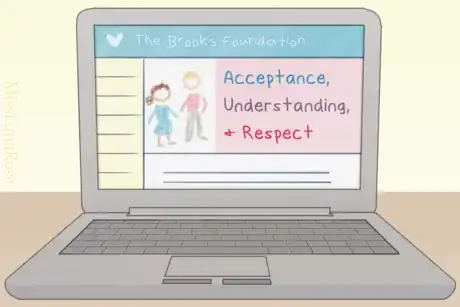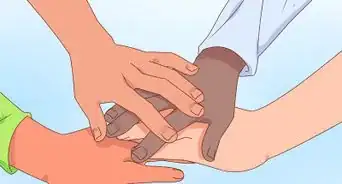This article was co-authored by Deb Schneider, LCSW, PPSC. Deb Schneider is a Licensed Clinical Social Worker in private practice in Oakland, CA, and a Program Manager for the Weiland Health Initiative at Stanford University. With over 15 years of experience, she specializes in creating safe spaces, respectful of marginalized identities, at the high school and college levels. Deb holds a Bachelor’s degree in Sociology and Women's Studies from Clark University and a Master of Social Work (MSW) with Health Concentration from the University of California, Berkeley School of Social Welfare.
This article has been viewed 5,629 times.
Being trans or nonbinary can be difficult at any age, but knowing you are trans and coming out at a very young age can be even harder. Living as your true self, however, can be very rewarding.
Steps
Preparing for Coming Out
-
1Accept who you are first. The first step is being yourself. Start by expressing your gender however you like. This could be getting a new haircut, or buying new clothes. Even if you don't have the courage to present as you wish yet, it can be incredibly therapeutic to see yourself how you want to see yourself. Accept the fact that this is who you are and stop worrying about what other people think because really, it is none of the haters' business.
- Choose a new name for yourself and decide which pronouns you want to use.
- Find the moments in your life that give you gender euphoria and really embrace them.
-
2Get an adult who can support you with coming out. Coming out as transgender can involve a lot of planning, and it helps to have a supportive mentor on your side. Find someone who is accepting, open-minded, and trustworthy. This person could be a parent, teacher, therapist, or anyone you are comfortable with.[1]
- You might come out to a family member or family friend who's supported you since you were a little kid. They can help you figure out how to come out to people who may not be as accepting.
Advertisement -
3Think about if it is safe to come out. Is your family/school safe for transgender people? Always put your own safety first. Ask an adult you trust for help with this.
- Talk to a supportive grown-up about safety. They have talked with lots of grown-ups and know a lot about the community. So they might know better what is safe.
-
4Get some books, movies, or websites that can teach people. People might not know what it means to be trans. So they may not know how to react. It can help to give them things that can teach them about transgender people.
-
5Plan how you are going to come out. How and where to come out depends on your personal style, and how you feel most comfortable. Do you want everyone to know at once, or gradually tell people one by one?
- Think about posting on social media. This is easy to spread, but you also might worry about your privacy now or in the future. If you want to use social media, have an adult help you.
- You might want to come out during school. It's important to meet with your teacher beforehand so that it can be planned in the day.
-
6Plan what you are going to say. It can help to have your words pre-planned. You can keep it short, or go a little longer if you want to. The most important part is to emphasize is that this is your real gender, and who you truly are.
- For example, you might say "When I was little, people thought I was a boy. But the truth is that I'm a girl. I need to be myself in order to be happy, so I'm not going to pretend to be a boy anymore, and I'm going to act and dress like the girl I really am. Please call me my real name, Jessica."
-
7Talk with teachers and other adults at school. It's important to let them know what is going on because they can help make sure that people understand your real gender, and intervene if people are being mean or disrespectful.
- Ask your family to set up a meeting with your teacher to talk about coming out at school.
- Your teacher may be willing to help you come out. For example, the teacher might read the class a book about transgender children, and then say that you have a special announcement to make.
- If the teacher is willing, you might be allowed to bring cupcakes or other food to celebrate you coming out. People might be especially receptive to the news if it comes with a tasty treat!
Coming Out
-
1Tell people you are close with first. If you have already told family, move on to your closest friends. Your best friends are more likely to accept that you are trans and may help you present yourself to the world. If your friends make a big deal about it, they are not true friends.
- Your family members and closest friends would probably prefer to hear it in person (or over the phone) instead of as a general announcement. Telling them personally helps them feel like they are special to you.
-
2Make the announcement. Try having someone supportive with you while you do so. Or, if you don't, think about all the people who care about you and accept you as the gender that you really are.
- Be careful of the comments section if you come out online. There are bullies and rude people online who might write mean things. It doesn't mean that what they say is true.
Tip: Be careful about posting online. When you're older, you might not want to tell everyone that you're trans. You might want to choose who knows and who doesn't. If it's online, it's harder to control who knows.
-
3Be yourself. Let yourself live happily as your true self. Focus on the good parts of your life, and spend time with the people who make you feel good.
- Wear the clothes that you love to wear, in a style that makes you happy. Keep in mind that girls (including trans girls) are allowed to be tomboyish, and boys (including trans boys) are allowed to like feminine things. Wear the style you like: sporty, nerdy, tomboyish, girly, cute, stylish, weird, or whatever feels right to you.
Expert Q&A
-
QuestionHow can I be confident in my identity?
 Deb Schneider, LCSW, PPSCDeb Schneider is a Licensed Clinical Social Worker in private practice in Oakland, CA, and a Program Manager for the Weiland Health Initiative at Stanford University. With over 15 years of experience, she specializes in creating safe spaces, respectful of marginalized identities, at the high school and college levels. Deb holds a Bachelor’s degree in Sociology and Women's Studies from Clark University and a Master of Social Work (MSW) with Health Concentration from the University of California, Berkeley School of Social Welfare.
Deb Schneider, LCSW, PPSCDeb Schneider is a Licensed Clinical Social Worker in private practice in Oakland, CA, and a Program Manager for the Weiland Health Initiative at Stanford University. With over 15 years of experience, she specializes in creating safe spaces, respectful of marginalized identities, at the high school and college levels. Deb holds a Bachelor’s degree in Sociology and Women's Studies from Clark University and a Master of Social Work (MSW) with Health Concentration from the University of California, Berkeley School of Social Welfare.
Licensed Clinical Social Worker Surround yourself with people who are supportive and affirming. It feels good to surround yourself with a community of friends and people who support you for who you are. It can also help to think about your LGBT ancestors who had to survive really difficult circumstances in their lifetimes. If they could survive and have a joyful life, then you can as well.
Surround yourself with people who are supportive and affirming. It feels good to surround yourself with a community of friends and people who support you for who you are. It can also help to think about your LGBT ancestors who had to survive really difficult circumstances in their lifetimes. If they could survive and have a joyful life, then you can as well. -
QuestionWhat do you call a person who is trans and gay at the same time?
 NicoTop AnswererA transgender gay person. That's it. There's really no specific type of term for an individual who is trans and gay.
NicoTop AnswererA transgender gay person. That's it. There's really no specific type of term for an individual who is trans and gay. -
QuestionHow can I be sure I'm transgender?
 NicoTop AnswererIf you are sure you're transgender, you will likely have no doubts/very little doubt about being trans, and be comfortable with your identity. Only you can know your gender for sure, so try not to rely on unprofessional gender quizzes and tests online. Check out the article How to Know if You Are Transgender or Figure Out Your Gender Identity for more information on being sure about your identity. If you have gender dysphoria or are having trouble understanding your gender, talk to someone you trust or visit a gender therapist.
NicoTop AnswererIf you are sure you're transgender, you will likely have no doubts/very little doubt about being trans, and be comfortable with your identity. Only you can know your gender for sure, so try not to rely on unprofessional gender quizzes and tests online. Check out the article How to Know if You Are Transgender or Figure Out Your Gender Identity for more information on being sure about your identity. If you have gender dysphoria or are having trouble understanding your gender, talk to someone you trust or visit a gender therapist.




















-Step-14-Version-2.webp)
















































